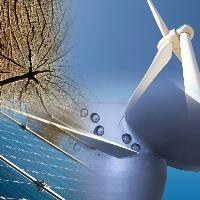(BRUSSELS) – The EU presented its response to the global energy market disruption caused by Russia’s invasion of Ukraine Wednesday, with plans to save energy, produce clean energy, and diversify energy supplies.
The driving force behind the plans is to end the EU’s dependence on Russian fossil fuels, which the EU says are used as an economic and political weapon and cost European taxpayers nearly EUR100 billion per year.
The measures accelerate EU efforts to tackle the climate crisis, through energy savings, diversification of energy supplies, and faster roll-out of renewable energy to replace fossil fuels in homes, industry and power generation.
The EU will not shirk action to face up to Russia’s “military aggression, thuggery and right up barbarism inflicted on a peaceful and democratic European country,” said the Commission’s executive vice-president Timmermans: “One of the many consequences of this unprecedented criminal behaviour is a massive disruption of European and global energy markets. This disruption affects us Europeans directly, profoundly because of our dependence on Russian fossil fuels,” he added. “It is clear we need to put an end to this dependence as soon as possible and a lot faster that we had foreseen before this war.”
The REPowerEU plan for saving energy, for producing clean energy, and diversifying our energy supplies has three elements.
On energy saving, the Commission proposes to enhance long-term energy efficiency measures, including an increase from 9% to 13% of the binding Energy Efficiency Target under the ‘Fit for 55’ package of European Green Deal legislation. An ‘EU Save Energy Communication’ details short-term behavioural changes which could cut gas and oil demand by 5% and encouraging Member States to start specific communication campaigns targeting households and industry. Member States are also encouraged to use fiscal measures to encourage energy savings, such as reduced VAT rates on energy efficient heating systems, building insulation and appliances and products. There are contingency measures in case of severe supply disruption, and there will be guidance on prioritisation criteria for customers and a coordinated EU demand reduction plan.
On diversification, the EU executive says it has been working with international partners to diversify supplies for several months, and has secured record levels of LNG imports and higher pipeline gas deliveries. The newly created EU Energy Platform, supported by regional task forces, will enable voluntary common purchases of gas, LNG and hydrogen by pooling demand, optimising infrastructure use and coordinating outreach to suppliers. As a next step, the EU executive will consider the development of a ‘joint purchasing mechanism’ which will negotiate and contract gas purchases on behalf of participating Member States.
A new EU External Energy Strategy will facilitate energy diversification and building long-term partnerships with suppliers, including cooperation on hydrogen or other green technologies. In line with the Global Gateway, the Strategy prioritises the EU’s commitment to the global green and just energy transition, increasing energy savings and efficiency to reduce the pressure on prices, boosting the development of renewables and hydrogen, and stepping up energy diplomacy. In the Mediterranean and North Sea, major hydrogen corridors will be developed. In the face of Russia’s aggression, the EU will support Ukraine, Moldova, the Western Balkans and Eastern Partnership countries, as well as most vulnerable partners.
A big scaling-up and speeding-up of renewable energy in power generation, industry, buildings and transport will accelerate Europe’s independence, says the Commission, with a proposal to increase the headline 2030 target for renewables from 40% to 45% under the Fit for 55 package.
Replacing coal, oil and natural gas in industrial processes will reduce greenhouse gas emissions and strengthen security and competitiveness. Energy savings, efficiency, fuel substitution, electrification, and an enhanced uptake of renewable hydrogen, biogas and biomethane by industry could save up to 35 bcm of natural gas by 2030 on top of what is foreseen under the Fit for 55 proposals.
The Commission will roll out carbon contracts for difference to support the uptake of green hydrogen by industry and specific financing for REPowerEU under the Innovation Fund, using emission trading revenues to further support the switch away from Russian fossil fuel dependencies. The Commission is also giving guidance on renewable energy and power purchase agreements and will provide a technical advisory facility with the European Investment Bank. To maintain and regain technological and industrial leadership in areas such as solar and hydrogen, and to support the workforce, the Commission proposes to establish an EU Solar Industry Alliance and a large-scale skills partnership.
REPowerEU Communication - background guide
Annexes to REPowerEU Communication
Staff Working Document: Investment needs, hydrogen accelerator and bio-methane plan
EU External Energy Engagement Strategy
Amendments to Renewable Energy, Energy Performance of Buildings and Energy Efficiency Directives
Recommendation on permitting procedures and Power Purchase Agreements
Regulation establishing the Recovery and Resilience Facility
Proposal for a Regulation on REPowerEU chapters in recovery and resilience plans
Guidance on recovery and resilience plans in the context of REPowerEU


